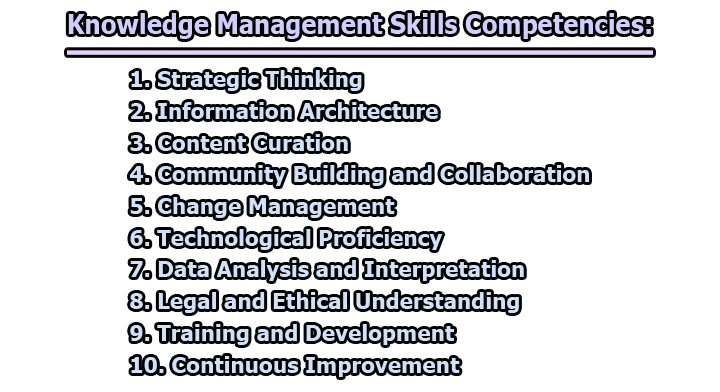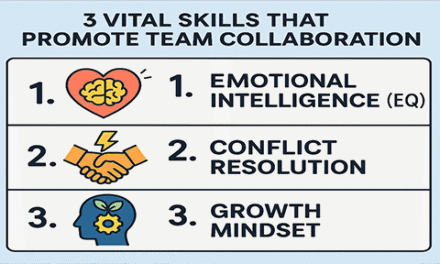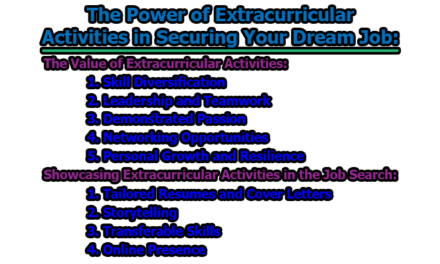Knowledge Management Skills Competencies:
In the rapidly evolving landscape of modern business, the effective management of knowledge has become a cornerstone for organizational success. Knowledge Management (KM) is not just a practice; it’s a set of skills and competencies that professionals must cultivate to drive innovation, enhance productivity, and ensure the sustainable growth of their organizations. In this article, we will explore knowledge management skills competencies.
1. Strategic Thinking: Strategic thinking lies at the heart of effective knowledge management. Knowledge managers must possess the ability to align their initiatives with the broader organizational strategy. This involves a deep understanding of the company’s mission, vision, and goals. Proficient strategic thinkers in knowledge management assess the competitive landscape, anticipate industry trends, and foresee potential challenges.
To excel in this competency, professionals should engage in regular strategic planning sessions, collaborating with key stakeholders to identify how knowledge assets can be leveraged to drive innovation and maintain a competitive edge. By weaving knowledge management into the fabric of the organizational strategy, professionals ensure that their efforts align with the long-term goals of the company.
2. Information Architecture: Crafting a robust information architecture is essential for knowledge managers. This competency encompasses the design, implementation, and maintenance of systems that organize information logically. Effective information architecture ensures that data is not just stored but is easily retrievable and can seamlessly integrate into various workflows across the organization.
Knowledge managers must be skilled in creating taxonomies, metadata structures, and search functionalities. They should consider user experience, ensuring that information is presented in a manner that facilitates efficient navigation. By paying meticulous attention to the organization’s information architecture, knowledge managers contribute to the overall accessibility and usability of knowledge assets.
3. Content Curation: Content curation is an art that requires discernment and a keen eye for relevance. Knowledge managers must sift through vast amounts of information to identify valuable insights, trends, and best practices. This competency involves not just the aggregation of data but also the curation of meaningful narratives that resonate with the needs of different stakeholders.
Professionals skilled in content curation are adept at selecting, organizing, and presenting information in a way that aligns with the strategic goals of the organization. They use tools and techniques to filter out noise, ensuring that the knowledge shared within the organization is of the highest quality and relevance.
4. Community Building and Collaboration: Knowledge thrives in dynamic communities. Competent knowledge managers understand the importance of community building and collaboration. This involves creating environments where employees feel encouraged to share their insights, experiences, and expertise.
To excel in this competency, knowledge managers should possess strong interpersonal and communication skills. They foster a culture of collaboration by implementing platforms, both physical and digital, that facilitate the exchange of knowledge. By cultivating a sense of community, professionals ensure that the organization becomes a hub for collaborative learning and knowledge creation.
5. Change Management: Change is inevitable, especially in the realm of knowledge management. Professionals need to be adept at change management to guide the organization through transitions in knowledge processes, tools, and cultural shifts. This competency involves understanding the psychology of change, anticipating resistance, and implementing strategies to facilitate a smooth adoption process.
Knowledge managers should be effective communicators, capable of articulating the benefits of change to various stakeholders. They develop and implement change management plans, addressing concerns, and ensuring that the organization embraces new knowledge management practices seamlessly. By mastering change management, knowledge managers become architects of organizational resilience and adaptability in the face of evolving business landscapes.
6. Technological Proficiency: In the age of digital transformation, technological proficiency is a non-negotiable competency for knowledge managers. This involves a deep understanding of knowledge management tools, databases, content management systems, and collaboration platforms. Proficient knowledge managers continuously stay abreast of emerging technologies, understanding their potential impact on knowledge management processes.
To excel in technological proficiency, professionals should actively seek training and certifications in relevant tools. They experiment with new technologies, identifying innovative solutions that can enhance information storage, retrieval, and collaboration within the organization. By staying tech-savvy, knowledge managers ensure that their strategies align with the latest advancements, maximizing the efficiency of knowledge management systems.
7. Data Analysis and Interpretation: Data analysis is a fundamental skill for knowledge managers tasked with deriving meaningful insights from the vast pool of information. This competency involves the use of analytical tools to interpret patterns, trends, and correlations within the data. Proficient knowledge managers transform raw data into actionable intelligence, providing valuable inputs for informed decision-making.
To master data analysis and interpretation, professionals should be familiar with statistical methods, data visualization tools, and business intelligence platforms. They should be able to communicate data-driven insights effectively, helping stakeholders understand the implications for the organization. By integrating data analysis into their repertoire, knowledge managers contribute to evidence-based decision-making and strategic planning.
8. Legal and Ethical Understanding: Knowledge managers operate within a framework of legal and ethical considerations. This competency requires a comprehensive understanding of data privacy laws, intellectual property rights, and ethical guidelines surrounding information management. Proficient knowledge managers ensure that their practices align with industry standards, mitigating legal risks and upholding ethical standards.
To excel in legal and ethical understanding, professionals should stay informed about evolving regulations related to data management. They develop and implement policies that safeguard sensitive information and intellectual property. By fostering a culture of ethical knowledge management, professionals build trust within the organization and ensure compliance with legal requirements.
9. Training and Development: Knowledge management is not solely about systems and processes; it’s also about people. This competency involves designing and implementing training programs that empower employees to actively participate in knowledge sharing. Proficient knowledge managers understand the importance of fostering a culture of continuous learning within the organization.
To excel in training and development, professionals should assess the knowledge needs of employees and design targeted programs. They facilitate workshops, webinars, and mentoring sessions to enhance the skills of individuals and teams. By investing in the development of employees, knowledge managers create a workforce that is not only knowledgeable but also engaged and motivated to contribute to the organization’s success.
10. Continuous Improvement: The landscape of knowledge management is dynamic, requiring professionals to embrace a mindset of continuous improvement. This competency involves staying informed about industry trends, technological advancements, and evolving organizational needs. Proficient knowledge managers regularly reassess and adapt their strategies to meet the ever-changing challenges of the business environment.
To excel in continuous improvement, professionals should actively seek feedback, conduct regular evaluations, and implement iterative enhancements to knowledge management processes. They participate in industry forums, attend conferences, and engage with professional networks to stay updated on the latest developments. By fostering a culture of continuous improvement, knowledge managers ensure that their strategies remain agile and relevant in the face of constant change.
In conclusion, mastering knowledge management skills is a multifaceted journey that encompasses strategic thinking, technological proficiency, and a deep understanding of the human and ethical dimensions of information management. By cultivating these competencies, professionals can navigate the complexities of the knowledge management landscape and contribute significantly to the resilience and growth of their organizations.

Library Lecturer at Nurul Amin Degree College










